China 'could take action against Japan' over disputed islands

China's national defense minister warned that Beijing reserves the right to take further action against Japan in the ongoing dispute over uninhabited islands in the East China Sea.
Standing next to US Defense Secretary Leon Panetta, General Liang Guanglie said Japan should bear full responsibility for the dispute, which has triggered violent protests in China against the Japanese. Panetta has been pressing both Liang and defense leaders in Japan to find ways to resolve the problem peacefully and diplomatically.
Liang, however, made it clear during a press conference that while China still would like to see a negotiated solution, he hopes the Japanese government "will undo its mistakes and come back to the right track of negotiations." Tensions over the string of islands, called the Senkakus in Japan and Diaoyu in China, spiked last week when the Japanese government said it was purchasing some of the islands from their private owner.
China's official Xinhua News Agency reported that during their private talks, Liang told Panetta that China was "resolutely opposed" to the islands' inclusion within the terms of the US-Japan mutual defense treaty, the agreement signed in 1951 as the US helped the island nation rebuild after World War II.
Liang said China hopes the US will honor its commitment to maintain a neutral stance, Xinhua reported.
The island dispute has been a hot topic during Panetta's weeklong tour of the Asia-Pacific region. But his session with Liang also touched on a wide expanse of issues as the US and China try to find a way to improve their military relationship.
US relations with China have been rocky, especially over America's support of and arms sales to Taiwan, the self-governing island that Beijing claims as its own. The US also has been critical of China for its lack of transparency regarding its massive military buildup.
"I've long believed that the United States-China relationship requires a long-term perspective," Panetta said during the press conference after a lengthy meeting Tuesday morning with Liang. "It is measured less by major breakthroughs than by slow, steady progress over time to build a relationship and to work on activities in areas of mutual interest."
In a move to enhance the relationship, Panetta announced that the US will invite China to send a ship to participate in a major military maritime exercise in 2014.
Both Panetta and Liang said they talked about how their two nations can improve communications and work toward developing a greater mutual trust.
Speaking through an interpreter, Liang said the US and China must work to gain a better understanding of each other so they can gradually reduce the ongoing suspicions that have plagued the relationship.
Their meeting came just days after the US forged an agreement to put a second missile-defense radar system in Japan, a move China is likely to view as another effort by the US to broaden its military power in the Asia-Pacific region.
This is Panetta's first trip to China as defense chief, and it is expected to include several historic visits, including a meeting Wednesday with the country's leader-in-waiting, Xi Jinping, just days after the ruler reappeared in public after a two-week absence.
Panetta's stay in China was extended in recent days so he could visit Qingdao, a key naval base where he will see a Chinese submarine and frigate.
China and the US also faced off over trade issues this week. China filed a World Trade Organization case Monday challenging US anti-dumping measures on billions of dollars of kitchen appliances, paper and other goods, adding to worsening trade strains as global demand weakens.
Beijing's move came shortly before the Obama administration filed its own WTO case accusing China of improperly subsidizing exports of automobiles and auto parts.
AP
Join our commenting forum
Join thought-provoking conversations, follow other Independent readers and see their replies
Comments
Bookmark popover
Removed from bookmarks